外研版(2019) 必修第二册 Unit 6 Earth First Listening & Speaking 课件-(33张ppt)
文档属性
| 名称 | 外研版(2019) 必修第二册 Unit 6 Earth First Listening & Speaking 课件-(33张ppt) | 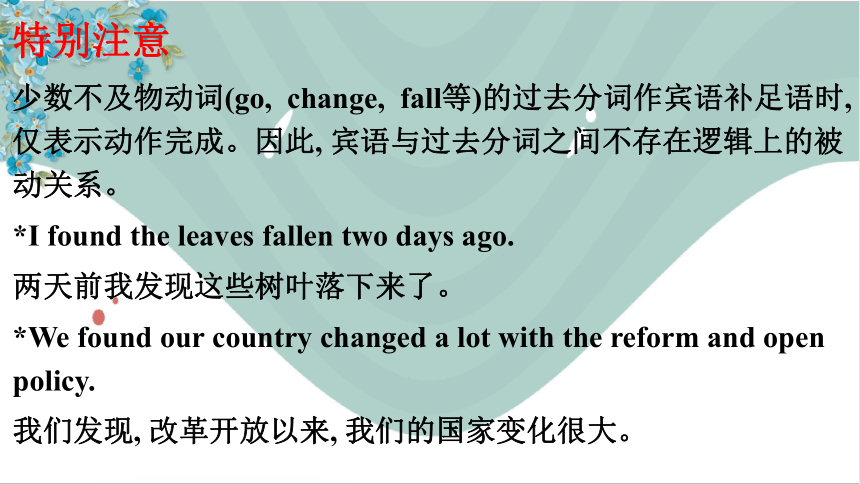 | |
| 格式 | pptx | ||
| 文件大小 | 12.0MB | ||
| 资源类型 | 教案 | ||
| 版本资源 | 外研版(2019) | ||
| 科目 | 英语 | ||
| 更新时间 | 2022-10-21 12:09:16 | ||
图片预览

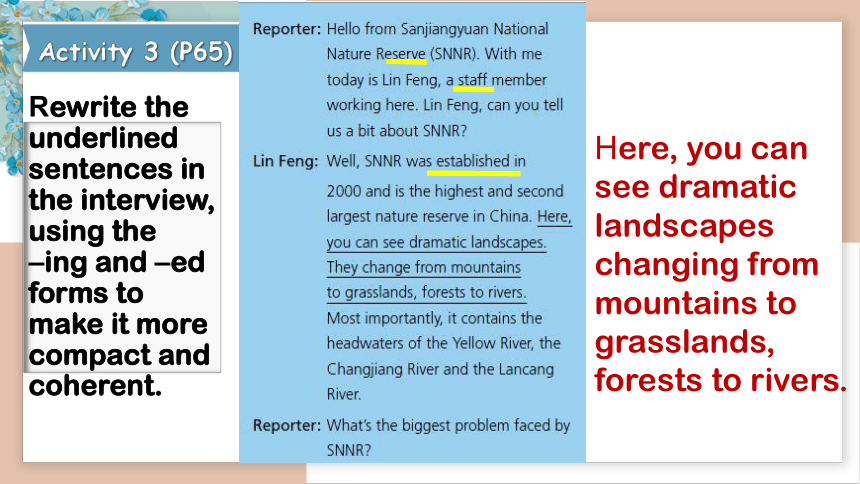

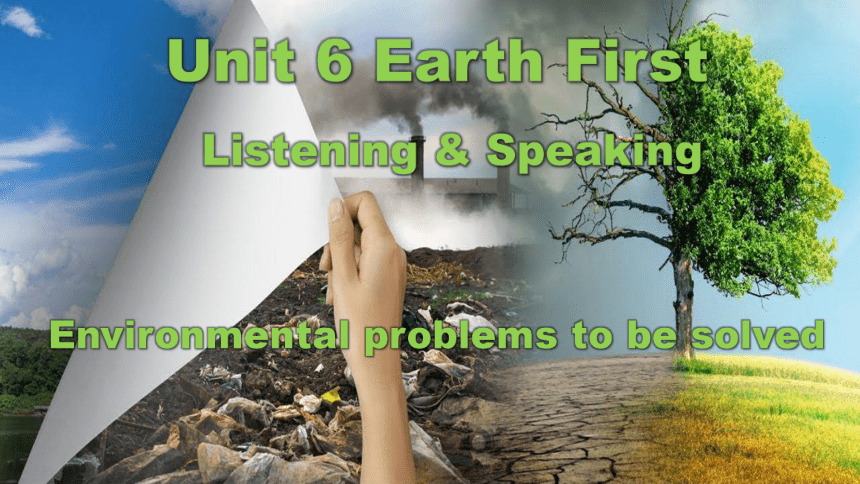
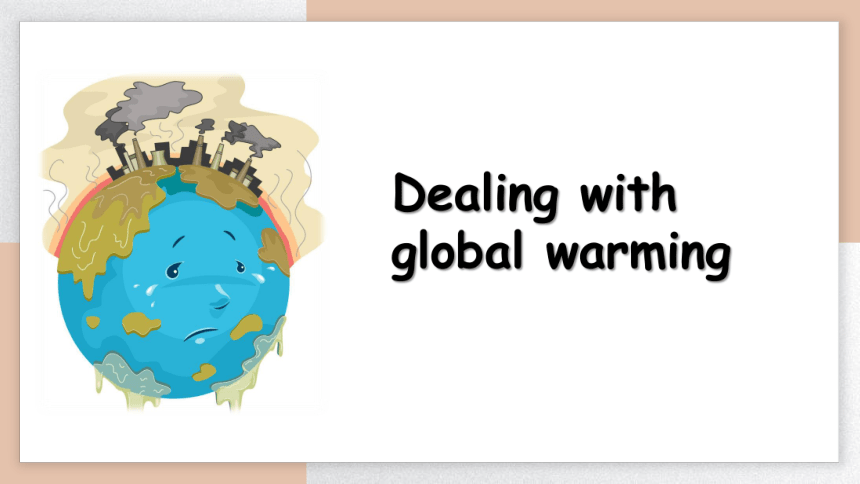

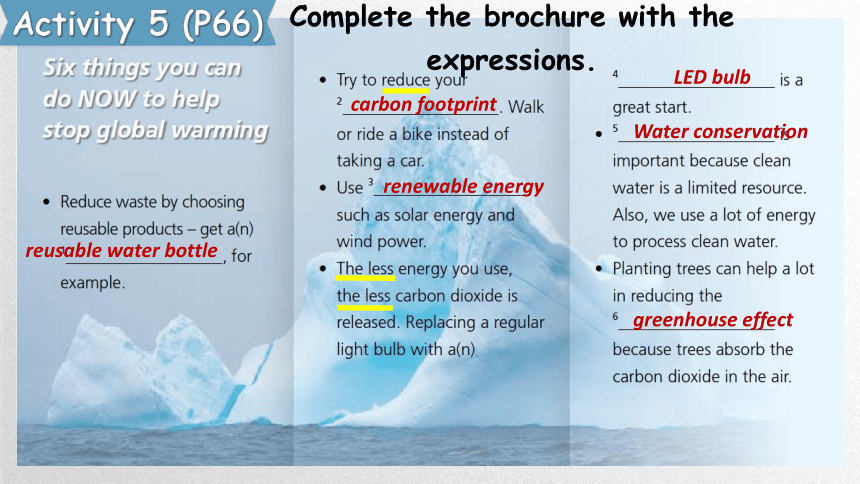




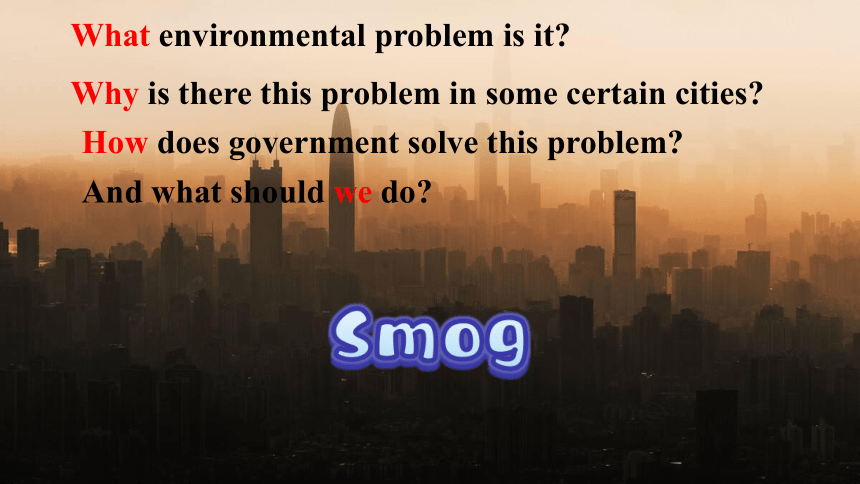
文档简介
(共33张PPT)
特别注意
少数不及物动词(go, change, fall等)的过去分词作宾语补足语时, 仅表示动作完成。因此, 宾语与过去分词之间不存在逻辑上的被动关系。
*I found the leaves fallen two days ago.
两天前我发现这些树叶落下来了。
*We found our country changed a lot with the reform and open policy.
我们发现, 改革开放以来, 我们的国家变化很大。
Activity 3 (P65)
Rewrite the underlined sentences in the interview, using the –ing and –ed forms to make it more compact and coherent.
Here, you can see dramatic landscapes changing from mountains to grasslands, forests to rivers.
Activity 3 (P65)
In recent years, we have seen large areas of wetland damaged by human activity.
This includes keeping the original environment untouched, …
Unit 6 Earth First
Listening & Speaking
Environmental problems to be solved
Dealing with
global warming
Share what you know about these expressions.
water conservation
LED bulb
renewable energy
carbon footprint
greenhouse effect
reusable
water bottle
Activity 4 (P66)
adj. 可更新的,可再生的,可续订的
n. 可再生资源
adj. 可重复使用的
Complete the brochure with the expressions.
reusable water bottle
carbon footprint
renewable energy
LED bulb
Water conservation
greenhouse effect
Activity 5 (P66)
reduce to 减少到 (同义decrease)
reduce by 减少了
The farmer workers reduce to 60% .
The farmer workers reduce by 40% .
(增加 increase/rise)
the +比较级,the +比较级 越... , 越...
The harder you work, the more chances you will have.
The longer you live in this city, the healthier you will become.
What environmental problem is it
Why is there this problem in some certain cities
How does government solve this problem
And what should we do
Smog
Did You Know
Smog comes from the words “smoke” and “fog”, and it is used to describe the air pollution in cities caused mainly by traffic and factories. Smog can be dangerous because it causes severe breathing problems and infections.
Environmental problems to be solved
启动计时器
Listen to the lecture and choose the topics that are covered. (P67)
1. What the word “smog” means.
2. When the word “smog” appeared.
3. What caused smog in the past.
4. What causes smog now.
5. The effects of smog on the environment.
6. How governments try to reduce smog.
7. What will happen if we don’t reduce smog.
smoke and fog
1900s
coal
chemicals
take measures
启动计时器
时间到!
启动计时器
时间到!
Listen again and complete the slides. (P67)
Smog in the past
Term created in: 1 _______
Big problem in London: 2 _______________
in December 1952
Causes of the problem: burning too much coal
and 3 __________
1900s
The Great Smog
no wind
Listen again and complete the slides. (P67)
Smog in the present
Causes of the problem: 4 ______
and factories
Measures: rules about using 5 ________ in factories
and 6 ______________ in
the city centre
chemicals coming from
chemicals
requirements of
traffic
paying to drive
Learning to learn
A polite interruption is usually framed as a request for permission to interrupt someone, often starting with If ..., May I ... or Can I ... This may be preceded with an apology such as Sorry, ... or Excuse me, ... Usually we interrupt someone when they pause for breath, or during the slight pause between spoken clauses.
Useful expressions
Please feel free to stop me if you have any questions.
Sorry to interrupt, but ...
I'm afraid...
Excuse me, but can I just ask...
Is it OK if I jump in for a second
Well,...
Could I just stop you again to check ...
Sorry. I've made a mistake.
Do you mind if I ask another question
You're right, ...
Group the following sentences into the right section.
polite interruption
sincere correction
启动计时器
时间到!
Useful expressions
Please feel free to stop me if you have any questions.
Sorry. I've made a mistake.
You're right, ...
I'm afraid...
Well,...
Sorry to interrupt, but ...
Excuse me, but can I just ask...
Could I just stop you again to check ...
Do you mind if I ask another question
Sorry, but I was wondering whether ...
Is it OK if I jump in for a second
Group the following sentences into the right section.
polite interruption
sincere correction
Pair work
Talk about recycling
Student A: Turn to Page 84.
Student B: Turn to Page 87.
problems
causes
measures
Classification of household waste
Different types of waste can be disposed and recycled appropriately.
We can make full use of it to create value.
……
3 steps to make a deep conversation
what why how
Work in pairs and talk about recycling.
Useful expressions A
Please feel free to stop me if you have any questions.
Sorry, I`ve made a mistake.
You`re right…
I`m aftraid…
Well…
Useful expressions B
Sorry to interrupt, but…
Excuse me, but can I just ask…
Could I just stop you again to check…
Do you mind if I ask another question
Sorry, but I was wondering whether…
Is it OK if I jump in for a second
Student A
Tell student B about recycling using the information below.
Be prepared to be corrected by Student B.
1 The classification of household waste aims to help people separate different types of waste. This is important because these different types of waste can be disposed or recycled appropriately and effectively.
2 Household waste can be roughly divided into:
food waste, non-recyclable waste, and recyclable waste, including paper, glass, plastic and used batteries
3 China plans to introduce household waste classification and sorting in the first batch of cities by 2020. Only Beijing, Shanghai, Tianjin and Chongqing are included in the first batch.
4 The target recycling rate in these cities has been set at 55% by 2020
Student B
Listen to Student A talking about recycling. Interrupt politely to correct him/her using the following information:
1 Used batteries are usually regarded as non-recyclable waste and should be disposed of separately.
2 The first batch of cities to introduce household waste classification and sorting includes Beijing, Shanghai, Tianjin, Chongqing and all capitals of provinces and autonomous regions.
3 The target recycling rate in these cities has been set at 35% by 2020.
Student A
Tell student B about recycling using the information below.
Be prepared to be corrected by Student B.
1 The classification of household waste aims to help people separate different types of waste. This is important because these different types of waste can be disposed or recycled appropriately and effectively.
2 Household waste can be roughly divided into:
food waste, non-recyclable waste, and recyclable waste, including paper, glass, plastic and used batteries
3 China plans to introduce household waste classification and sorting in the first batch of cities by 2020. Only Beijing, Shanghai, Tianjin and Chongqing are included in the first batch.
4 The target recycling rate in these cities has been set at 55% by 2020
Student B
Listen to Student A talking about recycling. Interrupt politely to correct him/her using the following information:
1 Used batteries are usually regarded as non-recyclable waste and should be disposed of separately.
2 The first batch of cities to introduce household waste classification and sorting includes Beijing, Shanghai, Tianjin, Chongqing and all capitals of provinces and autonomous regions.
3 The target recycling rate in these cities has been set at 35% by 2020.
启动计时器
时间到!
Student A
Tell student B about recycling using the information below.
Be prepared to be corrected by Student B.
1 The classification of household waste aims to help people separate different types of waste. This is important because these different types of waste can be disposed or recycled appropriately and effectively.
2 Household waste can be roughly divided into:
food waste, non-recyclable waste, and recyclable waste, including paper, glass, plastic and used batteries
3 China plans to introduce household waste classification and sorting in the first batch of cities by 2020. Only Beijing, Shanghai, Tianjin and Chongqing are included in the first batch.
4 The target recycling rate in these cities has been set at 55% by 2020
Student B
Listen to Student A talking about recycling. Interrupt politely to correct him/her using the following information:
1 Used batteries are usually regarded as non-recyclable waste and should be disposed of separately.
2 The first batch of cities to introduce household waste classification and sorting includes Beijing, Shanghai, Tianjin, Chongqing and all capitals of provinces and autonomous regions.
3 The target recycling rate in these cities has been set at 35% by 2020.
Possible version
1
A: Hey, xxx. Do you know anything about recycling It’s been a heated topic for a long time.
B: Yeah. One of it is the classification of household waste.
A: It is said that household waste can be roughly divided into three sorts, food waste, non-recyclable waste, and recyclable waste, including paper, glass, plastic and used batteries.
B: Sorry, could I stop you a little bit Used batteries are usually regarded as non-recyclable waste and should be disposed of separately.
A: Sorry, I’ve made a mistake. Besides that, China has made a plan for some metropolis to solve this environmental problem. Only Beijing, Shanghai, Tianjin and Chongqing are included in the first batch of cities by 2020.
B: Sorry, but I was wondering whether capitals of provinces and autonomous regions are also included.
A: Yeah, you are right. They all count. And do we need to recycle all of the waste I think the target recycling rate in these cities has been set at 55% by 2020.
B: Sorry to interrupt, but the rate should be 35% by 2020.
A: Well, let me see… Yeah, I’m afraid I got it wrong.
启动计时器
时间到!
Possible version
1
A: Hey, xxx. Do you know anything about recycling It’s been a heated topic for a long time.
B: Yeah. One of it is the classification of household waste.
A: Yeah, it aims to help people separate different types of waste. But why do we need to do so
B: I think it’s because if not, it would be hard for workers to dispose of or recycle different types of waste appropriately and effectively.
A: Oh, I get it. It is said that household waste can be roughly divided into three sorts, food waste, non-recyclable waste, and recyclable waste, including paper, glass, plastic and used batteries.
B: Sorry, could I stop you a little bit Used batteries are usually regarded as non-recyclable waste and should be disposed of separately.
A: Sorry, I’ve made a mistake. Besides that, China has made a plan for some metropolis to solve this environmental problem. Only Beijing, Shanghai, Tianjin and Chongqing are included in the first batch of cities by 2020.
B: Sorry, but I was wondering whether capitals of provinces and autonomous regions are also included.
A: Yeah, you are right. They all count. And do we need to recycle all of the waste I think the target recycling rate in these cities has been set at 55% by 2020.
B: Sorry to interrupt, but the rate should be 35% by 2020.
A: Well, let me see… Yeah, I’m afraid I got it wrong.
cause
Possible version
2
A: Hey, xxx. Do you know anything about recycling It’s been a heated topic for a long time.
B: Yeah. One of it is the classification of household waste.
A: Yeah, it aims to help people separate different types of waste. But why do we need to do so
B: I think it’s because if not, it would be hard for workers to dispose of or recycle different types of waste appropriately and effectively.
A: Oh, I get it. It is said that household waste can be roughly divided into three sorts, food waste, non-recyclable waste, and recyclable waste, including paper, glass, plastic and used batteries.
B: Seriously I do think you are wrong. Used batteries are usually regarded as non-recyclable waste and should be disposed of separately.
A: Sorry, I’ve made a mistake. Besides that, China has made a plan for some metropolis to solve this environmental problem. Only Beijing, Shanghai, Tianjin and Chongqing are included in the first batch of cities by 2020.
B: Sorry, but I was wondering whether capitals of provinces and autonomous regions are also included.
A: Yeah, you are right. They all count. And do we need to recycle all of the waste I think the target recycling rate in these cities has been set at 55% by 2020.
B: Sorry to interrupt, but the rate should be 35% by 2020.
A: Well, Jesus Christ. You almost made me insane …
启动计时器
时间到!
Possible version
2
A: Hey, xxx. Do you know anything about recycling It’s been a heated topic for a long time.
B: Yeah. One of it is the classification of household waste.
A: Yeah, it aims to help people separate different types of waste. But why do we need to do so
B: I think it’s because if not, it would be hard for workers to dispose of or recycle different types of waste appropriately and effectively.
A: Oh, I get it. It is said that household waste can be roughly divided into three sorts, food waste, non-recyclable waste, and recyclable waste, including paper, glass, plastic and used batteries.
B: Seriously I do think you are wrong. Used batteries are usually regarded as non-recyclable waste and should be disposed of separately.
A: Sorry, I’ve made a mistake. Besides that, China has made a plan for some metropolis to solve this environmental problem. Only Beijing, Shanghai, Tianjin and Chongqing are included in the first batch of cities by 2020.
B: Sorry, but I was wondering whether capitals of provinces and autonomous regions are also included.
A: Yeah, you are right. They all count. And do we need to recycle all of the waste I think the target recycling rate in these cities has been set at 55% by 2020.
B: Sorry to interrupt, but the rate should be 35% by 2020.
A: Well, Jesus Christ. You almost made me insane …
polite interruption
sincere correction
Environmental problems
to be solved
have been solved
Thanks for your listening!
特别注意
少数不及物动词(go, change, fall等)的过去分词作宾语补足语时, 仅表示动作完成。因此, 宾语与过去分词之间不存在逻辑上的被动关系。
*I found the leaves fallen two days ago.
两天前我发现这些树叶落下来了。
*We found our country changed a lot with the reform and open policy.
我们发现, 改革开放以来, 我们的国家变化很大。
Activity 3 (P65)
Rewrite the underlined sentences in the interview, using the –ing and –ed forms to make it more compact and coherent.
Here, you can see dramatic landscapes changing from mountains to grasslands, forests to rivers.
Activity 3 (P65)
In recent years, we have seen large areas of wetland damaged by human activity.
This includes keeping the original environment untouched, …
Unit 6 Earth First
Listening & Speaking
Environmental problems to be solved
Dealing with
global warming
Share what you know about these expressions.
water conservation
LED bulb
renewable energy
carbon footprint
greenhouse effect
reusable
water bottle
Activity 4 (P66)
adj. 可更新的,可再生的,可续订的
n. 可再生资源
adj. 可重复使用的
Complete the brochure with the expressions.
reusable water bottle
carbon footprint
renewable energy
LED bulb
Water conservation
greenhouse effect
Activity 5 (P66)
reduce to 减少到 (同义decrease)
reduce by 减少了
The farmer workers reduce to 60% .
The farmer workers reduce by 40% .
(增加 increase/rise)
the +比较级,the +比较级 越... , 越...
The harder you work, the more chances you will have.
The longer you live in this city, the healthier you will become.
What environmental problem is it
Why is there this problem in some certain cities
How does government solve this problem
And what should we do
Smog
Did You Know
Smog comes from the words “smoke” and “fog”, and it is used to describe the air pollution in cities caused mainly by traffic and factories. Smog can be dangerous because it causes severe breathing problems and infections.
Environmental problems to be solved
启动计时器
Listen to the lecture and choose the topics that are covered. (P67)
1. What the word “smog” means.
2. When the word “smog” appeared.
3. What caused smog in the past.
4. What causes smog now.
5. The effects of smog on the environment.
6. How governments try to reduce smog.
7. What will happen if we don’t reduce smog.
smoke and fog
1900s
coal
chemicals
take measures
启动计时器
时间到!
启动计时器
时间到!
Listen again and complete the slides. (P67)
Smog in the past
Term created in: 1 _______
Big problem in London: 2 _______________
in December 1952
Causes of the problem: burning too much coal
and 3 __________
1900s
The Great Smog
no wind
Listen again and complete the slides. (P67)
Smog in the present
Causes of the problem: 4 ______
and factories
Measures: rules about using 5 ________ in factories
and 6 ______________ in
the city centre
chemicals coming from
chemicals
requirements of
traffic
paying to drive
Learning to learn
A polite interruption is usually framed as a request for permission to interrupt someone, often starting with If ..., May I ... or Can I ... This may be preceded with an apology such as Sorry, ... or Excuse me, ... Usually we interrupt someone when they pause for breath, or during the slight pause between spoken clauses.
Useful expressions
Please feel free to stop me if you have any questions.
Sorry to interrupt, but ...
I'm afraid...
Excuse me, but can I just ask...
Is it OK if I jump in for a second
Well,...
Could I just stop you again to check ...
Sorry. I've made a mistake.
Do you mind if I ask another question
You're right, ...
Group the following sentences into the right section.
polite interruption
sincere correction
启动计时器
时间到!
Useful expressions
Please feel free to stop me if you have any questions.
Sorry. I've made a mistake.
You're right, ...
I'm afraid...
Well,...
Sorry to interrupt, but ...
Excuse me, but can I just ask...
Could I just stop you again to check ...
Do you mind if I ask another question
Sorry, but I was wondering whether ...
Is it OK if I jump in for a second
Group the following sentences into the right section.
polite interruption
sincere correction
Pair work
Talk about recycling
Student A: Turn to Page 84.
Student B: Turn to Page 87.
problems
causes
measures
Classification of household waste
Different types of waste can be disposed and recycled appropriately.
We can make full use of it to create value.
……
3 steps to make a deep conversation
what why how
Work in pairs and talk about recycling.
Useful expressions A
Please feel free to stop me if you have any questions.
Sorry, I`ve made a mistake.
You`re right…
I`m aftraid…
Well…
Useful expressions B
Sorry to interrupt, but…
Excuse me, but can I just ask…
Could I just stop you again to check…
Do you mind if I ask another question
Sorry, but I was wondering whether…
Is it OK if I jump in for a second
Student A
Tell student B about recycling using the information below.
Be prepared to be corrected by Student B.
1 The classification of household waste aims to help people separate different types of waste. This is important because these different types of waste can be disposed or recycled appropriately and effectively.
2 Household waste can be roughly divided into:
food waste, non-recyclable waste, and recyclable waste, including paper, glass, plastic and used batteries
3 China plans to introduce household waste classification and sorting in the first batch of cities by 2020. Only Beijing, Shanghai, Tianjin and Chongqing are included in the first batch.
4 The target recycling rate in these cities has been set at 55% by 2020
Student B
Listen to Student A talking about recycling. Interrupt politely to correct him/her using the following information:
1 Used batteries are usually regarded as non-recyclable waste and should be disposed of separately.
2 The first batch of cities to introduce household waste classification and sorting includes Beijing, Shanghai, Tianjin, Chongqing and all capitals of provinces and autonomous regions.
3 The target recycling rate in these cities has been set at 35% by 2020.
Student A
Tell student B about recycling using the information below.
Be prepared to be corrected by Student B.
1 The classification of household waste aims to help people separate different types of waste. This is important because these different types of waste can be disposed or recycled appropriately and effectively.
2 Household waste can be roughly divided into:
food waste, non-recyclable waste, and recyclable waste, including paper, glass, plastic and used batteries
3 China plans to introduce household waste classification and sorting in the first batch of cities by 2020. Only Beijing, Shanghai, Tianjin and Chongqing are included in the first batch.
4 The target recycling rate in these cities has been set at 55% by 2020
Student B
Listen to Student A talking about recycling. Interrupt politely to correct him/her using the following information:
1 Used batteries are usually regarded as non-recyclable waste and should be disposed of separately.
2 The first batch of cities to introduce household waste classification and sorting includes Beijing, Shanghai, Tianjin, Chongqing and all capitals of provinces and autonomous regions.
3 The target recycling rate in these cities has been set at 35% by 2020.
启动计时器
时间到!
Student A
Tell student B about recycling using the information below.
Be prepared to be corrected by Student B.
1 The classification of household waste aims to help people separate different types of waste. This is important because these different types of waste can be disposed or recycled appropriately and effectively.
2 Household waste can be roughly divided into:
food waste, non-recyclable waste, and recyclable waste, including paper, glass, plastic and used batteries
3 China plans to introduce household waste classification and sorting in the first batch of cities by 2020. Only Beijing, Shanghai, Tianjin and Chongqing are included in the first batch.
4 The target recycling rate in these cities has been set at 55% by 2020
Student B
Listen to Student A talking about recycling. Interrupt politely to correct him/her using the following information:
1 Used batteries are usually regarded as non-recyclable waste and should be disposed of separately.
2 The first batch of cities to introduce household waste classification and sorting includes Beijing, Shanghai, Tianjin, Chongqing and all capitals of provinces and autonomous regions.
3 The target recycling rate in these cities has been set at 35% by 2020.
Possible version
1
A: Hey, xxx. Do you know anything about recycling It’s been a heated topic for a long time.
B: Yeah. One of it is the classification of household waste.
A: It is said that household waste can be roughly divided into three sorts, food waste, non-recyclable waste, and recyclable waste, including paper, glass, plastic and used batteries.
B: Sorry, could I stop you a little bit Used batteries are usually regarded as non-recyclable waste and should be disposed of separately.
A: Sorry, I’ve made a mistake. Besides that, China has made a plan for some metropolis to solve this environmental problem. Only Beijing, Shanghai, Tianjin and Chongqing are included in the first batch of cities by 2020.
B: Sorry, but I was wondering whether capitals of provinces and autonomous regions are also included.
A: Yeah, you are right. They all count. And do we need to recycle all of the waste I think the target recycling rate in these cities has been set at 55% by 2020.
B: Sorry to interrupt, but the rate should be 35% by 2020.
A: Well, let me see… Yeah, I’m afraid I got it wrong.
启动计时器
时间到!
Possible version
1
A: Hey, xxx. Do you know anything about recycling It’s been a heated topic for a long time.
B: Yeah. One of it is the classification of household waste.
A: Yeah, it aims to help people separate different types of waste. But why do we need to do so
B: I think it’s because if not, it would be hard for workers to dispose of or recycle different types of waste appropriately and effectively.
A: Oh, I get it. It is said that household waste can be roughly divided into three sorts, food waste, non-recyclable waste, and recyclable waste, including paper, glass, plastic and used batteries.
B: Sorry, could I stop you a little bit Used batteries are usually regarded as non-recyclable waste and should be disposed of separately.
A: Sorry, I’ve made a mistake. Besides that, China has made a plan for some metropolis to solve this environmental problem. Only Beijing, Shanghai, Tianjin and Chongqing are included in the first batch of cities by 2020.
B: Sorry, but I was wondering whether capitals of provinces and autonomous regions are also included.
A: Yeah, you are right. They all count. And do we need to recycle all of the waste I think the target recycling rate in these cities has been set at 55% by 2020.
B: Sorry to interrupt, but the rate should be 35% by 2020.
A: Well, let me see… Yeah, I’m afraid I got it wrong.
cause
Possible version
2
A: Hey, xxx. Do you know anything about recycling It’s been a heated topic for a long time.
B: Yeah. One of it is the classification of household waste.
A: Yeah, it aims to help people separate different types of waste. But why do we need to do so
B: I think it’s because if not, it would be hard for workers to dispose of or recycle different types of waste appropriately and effectively.
A: Oh, I get it. It is said that household waste can be roughly divided into three sorts, food waste, non-recyclable waste, and recyclable waste, including paper, glass, plastic and used batteries.
B: Seriously I do think you are wrong. Used batteries are usually regarded as non-recyclable waste and should be disposed of separately.
A: Sorry, I’ve made a mistake. Besides that, China has made a plan for some metropolis to solve this environmental problem. Only Beijing, Shanghai, Tianjin and Chongqing are included in the first batch of cities by 2020.
B: Sorry, but I was wondering whether capitals of provinces and autonomous regions are also included.
A: Yeah, you are right. They all count. And do we need to recycle all of the waste I think the target recycling rate in these cities has been set at 55% by 2020.
B: Sorry to interrupt, but the rate should be 35% by 2020.
A: Well, Jesus Christ. You almost made me insane …
启动计时器
时间到!
Possible version
2
A: Hey, xxx. Do you know anything about recycling It’s been a heated topic for a long time.
B: Yeah. One of it is the classification of household waste.
A: Yeah, it aims to help people separate different types of waste. But why do we need to do so
B: I think it’s because if not, it would be hard for workers to dispose of or recycle different types of waste appropriately and effectively.
A: Oh, I get it. It is said that household waste can be roughly divided into three sorts, food waste, non-recyclable waste, and recyclable waste, including paper, glass, plastic and used batteries.
B: Seriously I do think you are wrong. Used batteries are usually regarded as non-recyclable waste and should be disposed of separately.
A: Sorry, I’ve made a mistake. Besides that, China has made a plan for some metropolis to solve this environmental problem. Only Beijing, Shanghai, Tianjin and Chongqing are included in the first batch of cities by 2020.
B: Sorry, but I was wondering whether capitals of provinces and autonomous regions are also included.
A: Yeah, you are right. They all count. And do we need to recycle all of the waste I think the target recycling rate in these cities has been set at 55% by 2020.
B: Sorry to interrupt, but the rate should be 35% by 2020.
A: Well, Jesus Christ. You almost made me insane …
polite interruption
sincere correction
Environmental problems
to be solved
have been solved
Thanks for your listening!
